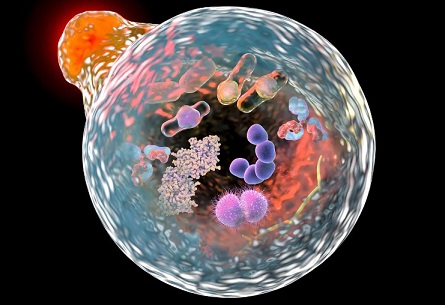Nikhil Prasad Fact checked by:Thailand Medical News Team Apr 17, 2024 1 year, 10 months, 1 week, 4 days, 7 hours, 25 minutes ago
COVID-19 News: The emergence of the COVID-19 pandemic caused by the SARS-CoV-2 virus has sparked extensive research into its mechanisms of infection and pathogenesis. Among the many areas of interest is the role of autophagy, a cellular process crucial for maintaining homeostasis by degrading and recycling cellular components. This
COVID-19 News report delves into a study conducted at Alexandria University, Egypt, focused on evaluating the expression levels of autophagy-related genes PIK3C3 and RAB7A in COVID-19 patients and their potential as monitoring markers for the disease.
 SARS-CoV-2 Causes Downregulation OF Autophagy Genes PIK3C3 And RAB7A
Background and Significance
SARS-CoV-2 Causes Downregulation OF Autophagy Genes PIK3C3 And RAB7A
Background and Significance
Coronaviruses like SARS-CoV-2 interact with host cell membranes during various stages of their life cycle, including entry, replication, and release. The angiotensin-converting enzyme 2 (ACE2) has been identified as the receptor for SARS-CoV-2, with the virus binding to ACE2 via its spike protein. Recent studies have highlighted the roles of PIK3C3 and RAB7A in viral entry and infection. Knockout of these genes has been shown to reduce viral entry and ACE2 cell surface expression, suggesting a protective effect against SARS-CoV-2 infection.
Autophagy and Its Implications
PIK3C3 and RAB7A are not only involved in viral entry mechanisms but also play crucial roles in autophagy, a cellular process implicated in the clearance of microorganisms. However, some pathogens exploit the autophagy machinery to survive and replicate. In the context of COVID-19, dysregulation of autophagy genes could contribute to the disease's progression, immune dysregulation, and multi-organ failure.
Study Design and Methods
A case-control study was conducted on 100 participants, including 50 COVID-19 patients and 50 healthy controls. The patients were recruited from Alexandria University Main Hospital between January 2022 and February 2022. Gene expression analysis was performed using quantitative real-time polymerase chain reaction (qPCR) to assess the levels of PIK3C3 and RAB7A in both groups.
Characteristics of Study Participants
The study's patient group had a mean age of 55.48 ± 9.94 years, with a slightly higher percentage of males (52%) than females (48%). Common symptoms among patients included fever, anosmia, fatigue, cough, sore throat, and bone aches, with fever being the most prevalent (86%). Laboratory findings showed elevated levels of neutrophils, C-reactive protein (CRP), interleukin-6 (IL-6), and D-dimer in COVID-19 patients compared to controls.
Results and Discussion
The results revealed a significant decrease in the expression levels of PIK3C3 (86.4%) and RAB7A (50.3%) in COVID-19 patients compared to healthy controls. These findings align with previous studies indicating reduced PIK3C3 expression in COVID-19 patients. However, RAB7A expression in COVID-19 patients' blood samples had not been previously studied.
/>
Implications for COVID-19 Management
Understanding the intricate interplay between viral infection, host cell processes like autophagy, and gene expression alterations is crucial for advancing COVID-19 management strategies. Targeting specific pathways or molecules implicated in viral entry and replication could pave the way for more effective treatments or preventive measures against SARS-CoV-2 and potentially other coronaviruses in the future.
Future Directions
Despite the observed reduction in PIK3C3 and RAB7A expression in COVID-19 patients, further research is warranted to elucidate their specific roles in the disease's pathogenesis. Additionally, investigating these genes across varying disease severities and in larger patient cohorts could provide deeper insights. While PIK3C3 and RAB7A may not currently serve as therapeutic targets, understanding their involvement in COVID-19 could aid in developing targeted interventions or diagnostic strategies in the future.
Conclusion
In conclusion, the study sheds light on the downregulation of autophagy genes PIK3C3 and RAB7A in COVID-19 patients and underscores the need for further investigation into their roles in disease pathogenesis. While these genes may not be immediate therapeutic targets, their potential as diagnostic markers or contributors to disease severity warrants continued research efforts in understanding COVID-19 at the molecular level.
The study findings were published in the peer reviewed journal: Human Immunology.
https://www.sciencedirect.com/science/article/abs/pii/S0198885924000612
Thailand Medical News would like to add that it should be noted that impairment of autophagy can lead to tumorigenesis and tumor progression.
https://www.nature.com/articles/s41580-023-00585-z
For the latest COVID-19 News, keep on logging to Thailand Medical News.
Read Also:
https://www.thailandmedical.news/news/italian-researchers-uncover-that-sars-cov-2-orf3c-protein-hijacks-mitochondrial-metabolism-and-autophagy
https://www.thailandmedical.news/news/covid-19-latest-yet-another-way-sars-cov-2-messes-up-host-immune-system-by-targeting-ulk1-kinase-enzymes-to-disrupt-cellular-autophagy
https://www.thailandmedical.news/news/covid-19-research-study-reveals-that-that-sars-cov-2-targets-proteins-involved-in-endocytosis-and-autophagy,-hijacking-these-cellular-processes
https://www.thailandmedical.news/news/breaking-german-researchers-discover-that-sars-cov-2-virus-proteins-manipulate-autophagy-in-human-host-cells
https://www.thailandmedical.news/news/breaking-new-international-study-warns-that-sars-cov-2-infections-will-lead-to-cancers-especially-colorectal-cancers-due-to-disruption-in-autophagy
https://www.thailandmedical.news/news/breaking-mutations-on-omicron-non-structural-protein-6-nsp6-alters-viral-disruption-modes-of-autophagy-in-host,-leading-to-possibly-more-serious-long-
https://www.thailandmedical.news/news/covid-19-news-sars-cov-2-orf7a-blocked-autophagy-flux-by-intervening-in-the-fusion-between-autophagosome-and-lysosome-to-promote-viral-infection
https://www.thailandmedical.news/news/study-find-that-sars-cov-2-proteins-orf3a-and-nsp5-regulate-autophagy-receptor-p62-levels,-decreasing-it-and-leading-to-hyperinflammation-states
https://www.thailandmedical.news/news/sars-cov-2-research-orf6-and-nsp13-proteins-cause-degradation-of-the-dna-damage-response-kinase-chk1-through-proteasome-and-autophagy
